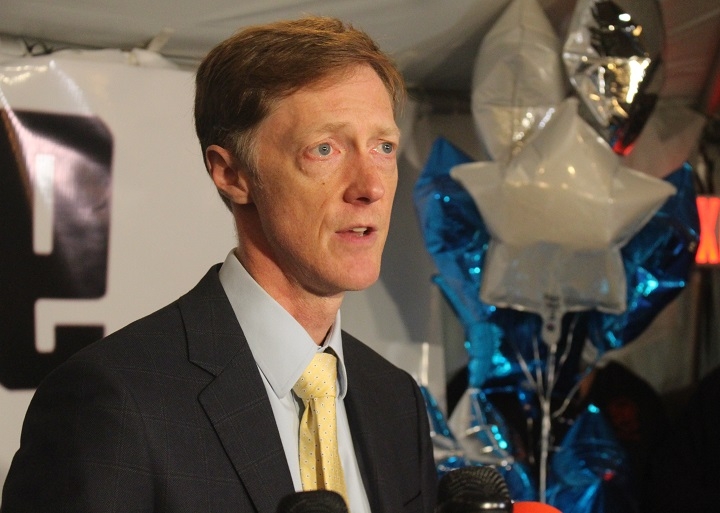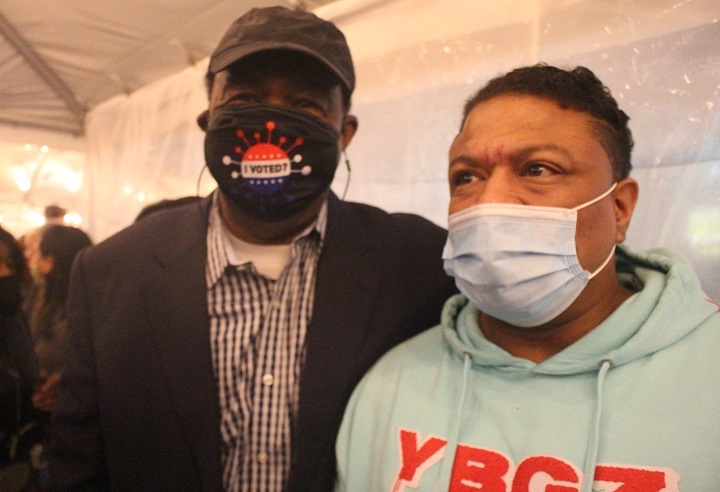
Thomas Breen photos
Mayor Elicker and daughter April at victory party.

Elicker party tent at Temple Grill.
Justin Elicker won a second two-year term as New Haven’s mayor Tuesday, soundly defeating a Republican challenger in all 30 of the city’s wards.

Note: These are the results from the polls. They do not include absentee ballots, which will not affect the outcome.
Elicker defeated Republican John Carlson — the first Republican mayoral candidate in 14 years — by 9,936 to 1,638 votes, or 84 to 13 percent based on tallies from all the city’s voting precincts. The count does not include absentee ballots. The city collected 1,500 of them, not enough to change the outcome. (Update Friday: Final official tallies, including absentee ballots, showed Elicker with 10,767 votes, John Carlson with 1,727 votes, and Independent Macey Torres with 166.)
Elicker, a Democrat, benefited from his party’s almost 14 – 1 advantage over the GOP in voting registration.
“We crushed it!” Elicker exulted in a victory speech to supporters at Temple Grill.
“We have put at the forefront compassion and caring for people,” Elicker said. “We’re finally at a point in our city when we’re not raising taxes and making cuts” every single year, but in a position to invest for the future. “We can choose the path that we’re headed in.”

Looking ahead, Elicker listed four top priorities for his second term:
• Climate change. “It is time that our city invests so much more in climate.”
• Youth. He promised to “invest in our young people” more with projects like the new Dixwell Community Q House, which he credited his mayoral predecessor Mayor Toni Harp for taking the lead on.
• Vocational training. “Not every child will go to college. They should know that we believe in them and that there are good jobs in those sectors.”
• Expanding substance abuse and mental health support for “vulnerable populations.”
He also pledged to “get across the finish line” programs like the community crisis response team, which will have social workers and trained mental health professionals instead of police officers respond to certain 911 calls.


Elicker with his wife Natalie, and kids Molly and April.
Elicker benefited this year from a widespread sense among voters that he had met the historic challenge of his first term — shepherding the city through the Covid-19 pandemic — with competence and seriousness; and that he now deserved a second two-year term to put other plans in place.
That sense changed the script of what might have been an otherwise more contentious campaign year: Elicker originally faced a Democratic mayoral primary challenge from housing authority Executive Director Karen DuBois-Walton. An energetic campaign took place throughout the city until DuBois-Walton pulled out of the race right before August’s Democratic Party convention, as some of her top issues — police accountability, racial equity, government experience — failed to register with voters as much as they might have in other years.
“I have a lot of respect for Dr. DuBois-Walton for her participation in this race,” Elicker said Tuesday night. He congratulated his GOP opponent Carlson for running a “very professional campaign.”

Newly reelected Board of Ed member Ed Joyner with city fire Capt. Troy Frost.

Newly elected Newhallville Alder Devin Avshalom-Smith, Westville Alder Darryl Brackeen Jr., Pastor Kelcy Steele, Rev. Roger Wilkins.

City fire union President Pat Cannon, Elicker campaign manager Kim Agyekum, Police Union President Florencio Cotto, Fire Capt. Troy Frost, and East Rock Alder Anna Festa.
Voters also elected Democrats to all 30 seats on the Board of Alders; and reelected Democratic City/Town Clerk Michael Smart and Board of Education member Edward Joyner.
“City Democrats showed in every ward that there is a vision and proven results for New Haven,” Democratic Town Chair Vincent Mauro Jr. said Tuesday night. “New Haven is a melting pot of ideas and personalities, and we are a good city with good people.”
He offered congratulations as well as to “my friend” Carlson of the GOP.

Sophie Sonnenfeld Photo
GOP clerk candidate Anthony Acri, alder candidate AnneMarie Rivera-Berrios, mayoral candidate John Carlson, and alder candidate Deborah Reyes at campaign HQ after the vote.
Still, the Republicans put up a fight, their biggest fight in more than a decade, including fielding four alder candidates on the east side of town, one on the west side, as well as a clerk and Board of Ed candidate along with Carlson.
“Hopefully in two years it’s a different result,” Carlson told supporters after the polls closed, as they gathered at the party’s Elm Street campaign headquarters.
“We have to stop the shooting. We have to stop the crime. I was happy to participate in this election and bring democracy back to the city.”
One significant alder race took place in Morris Cove’s Ward 18. The campaign became a referendum of sorts on the recent decision to expand Tweed New Haven Airport. Historically, support for the airport was considered the third rail of Morris Cove politics. But incumbent Democratic Alder Sal DeCola voted to approve the expansion plan (after amending it) — and he argued that a majority of ward voters now approve of the airport plans although they speak up less than opponents do. His opponent, Republican Steve Orosco, made opposition to the airport his central campaign plank. DeCola ended up winning reelection 614 – 401, not counting absentee ballots.
“The neighborhood is still solid,” DeCola said afterwards.
“There are a lot of angry people out there. Now we have to move forward.”
Orosco said his showing indicates that 400 people “are telling Sal, ‘You’re on thin ice!”’

Paul Bass Photo
Guardians of democracy: High School in the Community students Gian Rodriguez, Alex Gervaccio, and Alison Escobar set out from the Independent to collect election results from the polls in Fair Haven.

Lisa Reisman, Tom Breen, and Isaac Yu contributed reporting.